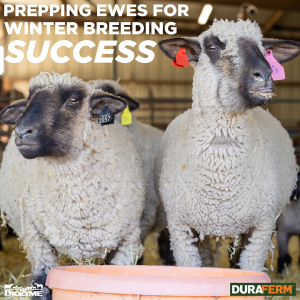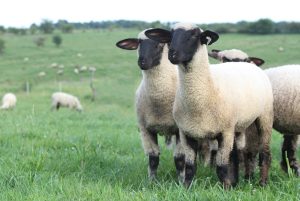
It’s often said that sheep are looking for a reason to die. The BioZyme® team consists of current and former sheep producers, who can definitely relate. However, the truth of the matter is that sheep are susceptible to stress. But at DuraFerm®, we want to help the producers keep their flock’s health top of mind. One way to maintain a healthy flock is to build awareness on sheep temperature.
It’s important for sheep producers and caretakers to regularly monitor the body temperature of their flock. This is especially true during periods of stress like extreme weather conditions, transportation or illness.
Deviations from the normal body temperature range may indicate underlying health issues. It could be a sign of possible infection, inflammation, heat stress or hypothermia. All those issues require prompt attention and veterinary care.
The ideal body temperature for a healthy sheep typically ranges between 101.5°F to 103.5°F (38.6°C to 39.7°C) when measured rectally. This temperature range may vary slightly. This variation will depend on age, breed, environmental conditions and individual variations among sheep.
The Importance of Maintaining Sheep Temperature
Sheep are uniquely susceptible to changes in body temperature. That’s why maintaining thermal comfort is essential for their health, well-being and productivity. Providing adequate shelter, ventilation, access to clean water and appropriate management practices helps support optimal thermoregulation and prevents heat stress or cold stress in sheep flocks.
Regular health monitoring, preventive measures and timely intervention are key components of effective sheep management strategies. Maintaining an ideal body temperature is crucial for the health and well-being of sheep within a flock. Here’s why it’s important:
1. Prevention of Heat Stress
Sheep are susceptible to heat stress, especially in hot and humid climates. When sheep are unable to dissipate excess body heat effectively, they can experience heat stress. If left untreated, heat stress may lead to dehydration, reduced feed intake, lethargy and, in severe cases, death. Maintaining an ideal body temperature helps prevent heat stress and its associated health issues.
2. Optimal Production Performance
Sheep with elevated body temperatures may experience decreased production performance, including reduced weight gain, lower milk production in lactating ewes and impaired reproductive efficiency. By maintaining an ideal body temperature, sheep are better able to maintain their metabolic processes, support growth, reproduction and lactation and achieve optimal performance levels.
3. Healthy Immune Function
Elevated body temperatures can compromise the immune system’s function, making sheep more susceptible to infectious diseases and opportunistic pathogens. By regulating body temperature within the normal range, sheep can maintain robust immune function, resist pathogens and mount effective immune responses to infections, ultimately reducing the risk of disease outbreaks within the flock.
4. Improved Feed Efficiency
Sheep with elevated body temperatures may experience reduced feed efficiency. This is because their metabolic energy is going toward thermoregulation and maintaining body temperature instead of growth or production. By preventing heat stress and maintaining a comfortable thermal environment, sheep can allocate more energy toward feed utilization, digestion and nutrient absorption, resulting in improved feed efficiency and overall productivity.
5. Reduced Risk of Hypothermia in Cold Weather
In cold climates or during adverse weather conditions, maintaining an ideal body temperature helps protect sheep from hypothermia and cold stress. Sheep with inadequate insulation or compromised thermoregulatory mechanisms may experience hypothermia, which can lead to decreased metabolic rate, impaired circulation and increased susceptibility to respiratory infections and other health issues.
6. Enhanced Comfort and Welfare
Maintaining an ideal body temperature promotes the comfort, well-being and overall welfare of sheep within the flock. Comfortable sheep are more likely to exhibit normal behavioral patterns, such as grazing, resting and socializing. They are less prone to stress-related behaviors or health problems associated with thermal discomfort.
Overall, maintaining an ideal body temperature in a sheep flock is essential for promoting health, productivity, immune function, feed efficiency and overall well-being. By implementing best management practices and monitoring sheep for signs of heat or cold stress, producers can ensure that their flocks remain comfortable, healthy and resilient to environmental challenges.
Signs of Heat Stress in Sheep
Although hypothermia is also a concern, for the purpose of this blog, we are going to focus on the other sheep temperature extreme – heat stress. Heat stress in sheep can appear through various signs and symptoms, indicating that the animal is struggling to regulate its body temperature effectively in hot and humid conditions. Recognizing these signs quickly is crucial in preventing heat stress and adverse health outcomes. Here are 10 common signs of heat stress in sheep:
1. Excessive Panting
Panting is a primary mechanism for sheep to dissipate heat and regulate body temperature. During heat stress, sheep may exhibit rapid or labored breathing, open-mouth breathing and excessive panting as they attempt to cool down.
2. Increased Respiration Rate
Heat-stressed sheep may have elevated respiratory rates compared to normal conditions. The respiratory rate may be noticeably faster and shallower as the sheep’s body attempts to expel excess heat through respiration.
3. Salivation and Drooling
Heat-stressed sheep may exhibit increased salivation or drooling, which can be a sign of discomfort and elevated body temperature. Excessive salivation may occur as the sheep attempts to cool down and maintain hydration.
4. Decreased Feed Intake
Heat stress can suppress appetite and reduce feed consumption in sheep, leading to decreased weight gain or milk production in lactating ewes. Heat-stressed sheep may show disinterest in grazing or eating, leading to decreased feed intake and potential nutritional deficiencies.
5. Reduced Activity and Lethargy
Heat-stressed sheep may become lethargic and show decreased activity levels. They may prefer lying down in shaded areas rather than grazing or moving around. Reduced activity is a common response to conserve energy and minimize heat production.
6. Elevated Body Temperature
Monitoring rectal temperature can help assess the severity of heat stress in sheep. An elevated body temperature above the normal range (101.5°F to 103.5°F or 38.6°C to 39.7°C) indicates heat stress and may warrant immediate intervention.
If contacting your veterinarian, he or she will likely want to know your sheep’s temperature. Be sure to know how to take the temperature properly using a rectal thermometer.
7. Increased Water Consumption
Heat-stressed sheep may drink more water than usual as they attempt to stay hydrated and regulate body temperature. Providing access to clean, fresh water is essential during periods of heat stress to prevent dehydration and maintain hydration.
8. Signs of Distress
Heat-stressed sheep may exhibit signs of distress, such as restlessness, agitation or vocalization. They may display signs of discomfort, including pawing at the ground, rubbing against objects or seeking shade and ventilation to escape the heat.
9. Deteriorating Coat Condition
Heat stress can affect the quality of the sheep’s coat, causing it to appear dull, dry or rough. Sheep may exhibit signs of coat shedding or excessive wool loss as they attempt to dissipate heat and regulate body temperature.
10. Increased Susceptibility to Health Issues
Prolonged heat stress can weaken the immune system and increase the sheep’s susceptibility to health problems, including heatstroke, dehydration, metabolic disorders and respiratory infections.
Recognizing and addressing signs of heat stress promptly is crucial for minimizing the risk of heat-related complications and promoting the well-being of sheep during hot weather conditions. Implementing preventive measures helps mitigate the impact of heat stress and supports optimal health and productivity in sheep flocks.
Preventing Heat Stress in your Sheep
Preventing heat stress in sheep requires proactive management strategies and environmental modifications to minimize the risk of heat-related complications and promote the well-being of the flock. Here are 6 effective ways to prevent heat stress in sheep.
1. Provide Adequate Shade & Proper Ventilation
Ensure that sheep have access to shaded areas throughout the day, especially during the hottest hours from 10 am to 2 pm. This can include natural shade from trees or man-made structures such as shelters or shade cloths.
Good airflow is essential to help dissipate heat and keep sheep cool. Ensure that barns, pens and other housing facilities are well-ventilated by using fans, vents or open windows to encourage air circulation.
2. Offer Plenty of Fresh Water & Adjust Feeding Practices
Sheep need access to clean, fresh water at all times, especially during hot weather. Ensure that water tanks are kept clean and filled regularly to encourage adequate hydration.
Modify feeding schedules to avoid feeding during the hottest parts of the day. Consider offering high-quality forage and supplements during cooler times, such as early morning or late evening, to reduce metabolic heat production.
3. Shear Wool
Shearing sheep before the onset of hot weather can help prevent heat stress by removing excess insulation. Sheared sheep are better able to regulate their body temperature and dissipate heat more effectively.
4. Monitor Body Condition
Keep an eye on the body condition of your sheep, as overweight or obese sheep are more prone to heat stress. Ensure that sheep are at a healthy weight and adjust feeding practices as needed to prevent obesity.
5. Reduce Handling and Stress
Minimize handling and other stressors during hot weather, as stress can exacerbate heat stress in sheep. Handle sheep gently and avoid unnecessary movement or transportation during periods of extreme heat.
6. Monitor for Signs of Heat Stress
Keep a close eye on your flock for signs of heat stress, including excessive panting, drooling, restlessness or weakness. Act quickly if you notice any signs of distress and provide immediate relief and veterinary attention if necessary.
By implementing these preventive measures and paying close attention to the needs of your flock, you can help keep your sheep healthy and comfortable. Know how to regulate sheep temperature during periods of hot weather and minimize the risk of heat stress-related complications.
BioZyme® Can Help
At BioZyme, we care about all species. That is why we created the DuraFerm® line of line of nutritional supplements for sheep and goats that supports optimal digestion and nutrition for maximized performance at every stage of production.
DuraFerm® Sheep Concept•Aid® HEAT®
DuraFerm Sheep Concept•Aid HEAT is a free-choice vitamin and mineral supplement for sheep designed to support reproductive success when temperatures are above 70 degrees. It is an ideal mineral to feed in the summer months to help control sheep temperature.
It contains AO-Biotics® Amaferm®, a prebiotic research-proven to enhance digestibility, and the HEAT technology, a combination of essential oils and garlic, to support animals when heat and insects are a challenge. DuraFerm Sheep Concept•Aid HEAT supports embryo production and conception using organic trace minerals and high levels of vitamin E.
Sure Champ® Liquid Boost®
Another option you can provide your flock is Sure Champ Liquid Boost with Vita Charge® technology. Although not technically an electrolyte, Liquid Boost is a liquid for all livestock designed to provide immediate support to the animal’s digestive and immune system. Formerly known as Vita Charge Liquid Boost, it contains AO-Biotics® Amaferm®, a prebiotic research-proven to enhance digestibility and MOS (mannan oligosaccharides) to help normalize gut microflora and support the immune system. It also contains flavoring to help drive intake of feed or water.
The Vita Charge Technology contains a unique blend of ingredients to help support animal health before, during or after the stress response. Every product with Vita Charge Technology contains an exact amount of B vitamins, vitamin E, potassium, zinc, MOS and Amaferm. In addition, a precisely defined salt to sugar ratio ensures your animal’s hydration. This combination provides undeniable impact to livestock under stress, embodying BioZyme’s overall purpose to provide “care that comes full circle.”
Get your BioZyme Products Today
We don’t want you to stress about your sheep temperature. Be proactive and keep your flock cool with these products we’ve described from BioZyme.
Get your DuraFerm or Liquid Boost from a dealer near you. Find a dealer closest to you by using our dealer locator.
Perhaps you want to buy it online. You certainly can!
Want more information about DuraFerm or and raising a healthy flock? Visit us online.

